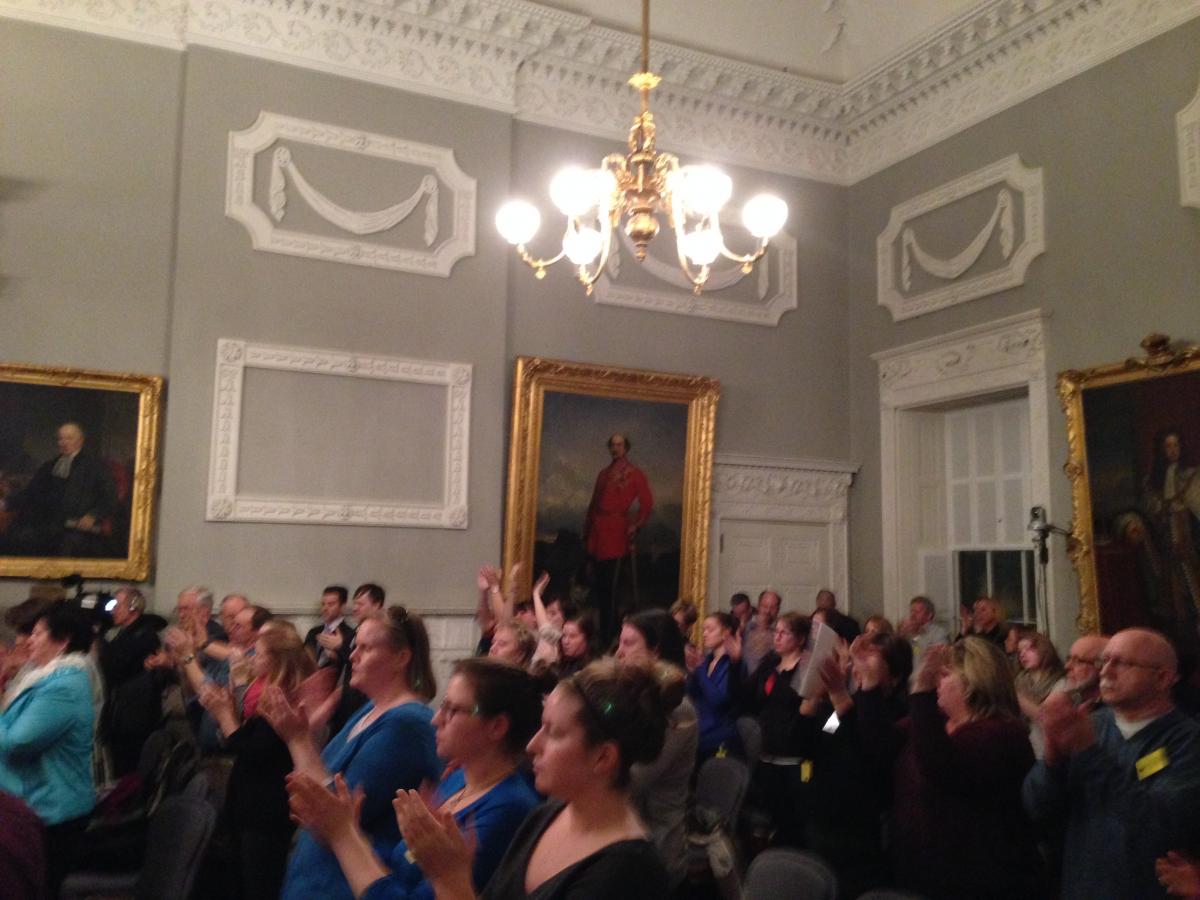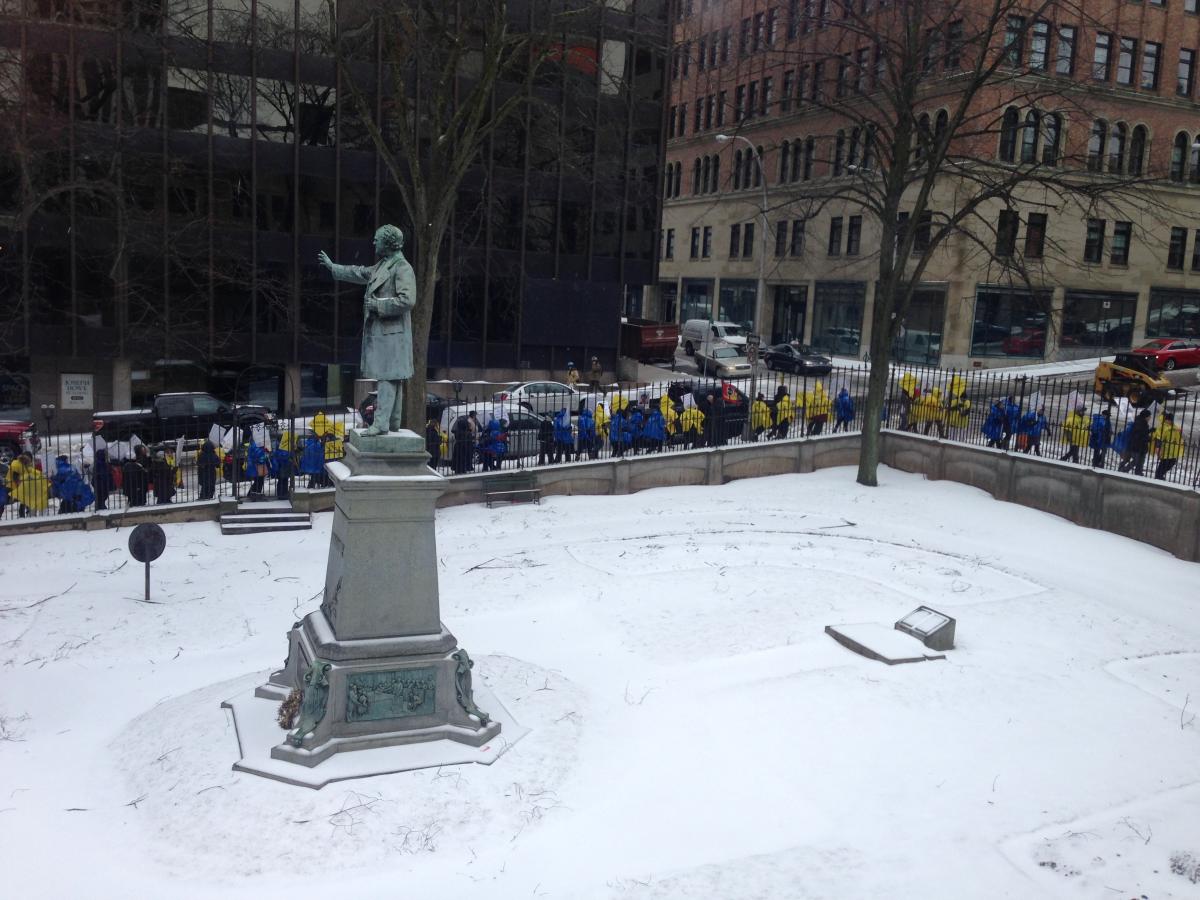The day after the National Day of Action for the Health Accord, I was looking forward to a busy day collecting media hits, looking for photos, being in touch with supporters and activists that worked on organizing an amazing day of action, and getting caught up on email.
But the day was completely different than I expected. At 7 p.m. Monday night, after just getting home I saw on social media that the Nova Scotia government was passing essential services legislation (Bill 37) that would restrict the right of all health-care workers from striking.
Included in the legislation is: 911 operators, nurses, hospital workers, paramedics and workers at homes for seniors, the disabled and youth. Professors and negotiators are calling it the most “radical and far-reaching legislation in Nova Scotia since 1972 (the Trade Union Act)” and the TUA was about building worker’s rights, not taking them away, as Lana Payne pointed out.
I was shocked. I got on the phone and was told to meet with the nurses at 7 a.m. the next morning.
When I arrived at the hotel conference room, hundreds of nurses were gathered to learn about the legislation that was being written while their union was at the negotiation table.
Many of the nurses in the room chose to go on strike that morning knowing the strike was illegal, knowing they faced fines of $1,000. We learned during the morning that some nurses had been locked out of their workplace by the employer. A hospital even locked their doors to health-care providers wanting to work.
We filled Law and Amendments at the Nova Scotia Legislature with presenters and allies by 9 a.m. Outside, health-care workers from NSGEU, CUPE, NSNU and others (like CUPW) surrounded Province House. Inside the House, you could hear the chants, shouts and car honks from below.
Workers remained outside for hours — most of the day in fact — despite heavy wind, rains and fierce hail (seriously, it really hurt). Inside, almost 200 speakers presented. It went all night and into the early morning hours.

The day was exhausting and I only lasted until 1:30 a.m. But what I did witness was an absolute privilege. Brothers and sisters spoke about their experiences in many health-care careers. Stories were sometimes personal, often emotional, and always conveyed the passion that health-care workers have for their patients. Some health-care workers apologized for their dress or their emotions and explained they’d just gotten off a shift when they heard their rights were being taken way. They immediately went to the hotel to gather with their brothers and sisters and despite utter exhaustion and intimidation, they sat before the committee to speak on behalf of their patients. Many had now been awake for well over 24 hours.
Many workers were presenting at the provincial Law Amendments Committee for the first time. They said they were nervous, shy, uncomfortable, but you wouldn’t have known it because they spoke calmly, eloquently and confidently.
I can’t share all the stories with you (please see my live-tweeting stream: @asilnicki), but let me share a couple:
One hospital social worker told us that she started in the hospital 6 years ago and in that time her caseload has doubled while her colleagues’ jobs have disappeared. Meaning she has fewer people to send her patients to and twice as many patients needing her help.
Several health-care workers said that they had pacts with friends that if one of them were hospitalized they would all make sure that person had an advocate with them around the clock. They explained that nurses were so overwhelmed patients simply weren’t getting the care they needed.
Other health-care workers cried in front of the panel saying they were burnt out. Several of these nurses were under 25 years old, overwhelmed and exhausted. They love being in a workplace were they can help people, but they’re terrified every day that they’ll have their license taken away for a mistake made while dealing with staff shortages, or because they didn’t have any mentors working with them. One woman told the committee that at 24 years of age with just 3 years of nursing, she was the senior nurse on her shifts in the post-surgical department where people’s conditions can worsen rapidly. Several say they’re looking to work in other provinces, and some have already applied.
Some numbers were given as well. On an average night in the ICU, there’s a staffing shortage of nurses. Because of the amount of care involved and the high stakes of the ICU, the patient-to-nurse ratio must be 1:1; often it’s 1:2. One Licensed Practical Nurse (LPN) presenter said that she often finds herself attending to 16 patients. One recent graduate said she’s sometimes working 76 hours in a week.
Many health-care workers told us of the severe staffing shortages they face. They know they can’t be replaced if they’re unable to work a shift and they know that places incredible stress on their fellow workers. And so they go to work no matter what. Some talk of leaving their own family member’s bedside, some grieving the lost of their own loved one while going to work to help families through their grief. They told us of workplace injuries (backs and necks were most often mentioned) sustained from lifting or adjusting patients alone because other workers aren’t available to assist or they’re working alone. Despite those injuries, they returned to work their next shift.
There was clearly a lot of frustration at workplace conditions. Health-care workers talked of going to management and asking for help, explaining the situation and saying they knew they weren’t providing the best quality of care, mistakes were being made, big ones are bound to happen. But they felt ignored, disregarded and that their comments weren’t heard.

Larry Haiven and others testified that when the right to strike was taken from health-care workers in Alberta, the number of strikes rose by 15 per cent. Rick Clarke adds that it was also when the longest strike in Canada was held. Clarke warned the committee “you haven’t dodged a bullet here.”
Perhaps the most emotional part of the night for me was watching these brave men and women speak to a large panel of MLAs (one woman aptly said “it’s nice to have a room of women behind me and a bunch of men in front of me”) and seeing the Nova Scotia Liberals remain absolutely silent. After each presenter, the committee had five minutes of question and answer. Not once in the over 16 hours of testimony that I witnessed did the Liberal party ask a single question, make a comment, and besides the Chair, not one thanked a presenter. Many, many presenters mentioned this in their comments. They pleaded to be “heard, not just listened to.” The only time a member (other than the Chair) of the party in power spoke was when they read a letter and motion to the committee from their leader, Stephen McNeil. The motion was to stop Law Amendments at 11:30 p.m. (almost 100 speakers were still on the list, all having to waiting at least 6 hours to speak) and to table the order in the house with no amendments.
The NDP and Conservative parties worked together on a filibuster and several amendments that eventually resulted in the Liberals tabling a new motion which would allow all of the remaining speakers to present and then at 1 p.m. the following day, Bill 37 would be presented to the house (amendments would still be an option).

For me, and I think most people in the room, it was hard to hear hours of testimony go by, see presenters shaken and vulnerable, pleading (literally pleading and begging) the Liberals to change this motion and then witness them use their voices for the first time that day to table a motion that would ensure no amendments to the bill.
The committee resumed. And shortly thereafter Ronnie Milley, a young nurse, thanked the opposition parties for protecting his right to speak. He had waited over seven hours and was cut off at the five-minute mark exactly.
By 1:30 a.m. my own exhaustion and hunger set in and I had to leave. I left inspired by all the stories I had heard, by the obvious passion for patients felt by the health-care workers and by the support they had from citizen witnesses.
The next day at 1 p.m. Bill 37 will be tabled in provincial legislature. It will take away the right to strike from health-care workers. The provincial government is deeming all health-care workers essential services and saying they have no right to strike as a result, even though emergency services plans are always put in place by unions when health-care workers strike — many workers brought the binders of procedures to show the committee, who were already well aware.
I hope to be in the Legislature for the 1 p.m. reading. The Council of Canadians will continue to support our health-care brothers and sisters and oppose Bill 37. The health-care workers last night said it best: “if you take away our voices, you prevent us from speaking out for our patients.”



